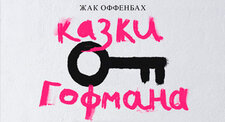Upcoming shows

Libretto by J. Barbier based on the short stories by E. T. A. Hoffmann.
SUMMARY
Prologue
A cafe next to the theater, where the poet, artist, and musician Hoffmann loves to spend time. It is fun and noisy here. Here you can forget about the troubles of life. Today the theater is performing Mozart’s "Don Giovanni”. Donna Anna is sung by the opera prima donna Stella. Through her servant Andreas, she gives the enamored Hoffmann a note with the key to her room. But after bribing the servant, the letter is intercepted by Councilor Lindorf, who is also trying to win Stella's favor. Hoffmann enters with his faithful companion Nicklausse. The cafe patrons are looking forward to a fun evening: the poet is famous for his inexhaustible wit. At the request of his friends, he sings a playful song about Kleinzach. However, Hoffmann's thoughts are tied to Stella. He begins to confuse verses, singing not about Kleinzach, but about his beloved. One of his friends, Nathanael, claims that Hoffmann is in love again. But the poet just laughs. The hitherto silent Lindorf enters the conversation. He doubts whether Hoffmann is able to love anyone at all. Caught by the remarks, the young man is ready to tell of his heartfelt passions. Fantasizing, he seems to want to unravel who really is his beloved Stella, who is the one in whom “three souls, three hearts” were embodied for the poet? He begins the story, involving everyone around him.
Act One. Olympia
In Hoffmann's first tale, there are two thieves, Spalanzani and Coppelius. Together, the two charlatans designed a wonderful mechanical doll and named it Olympia. Hoffmann fell in love as soon as he saw her. Hoping to meet Olympia, Hoffmann is ready to take physics lessons from Spalanzani. Suddenly Coppelius appears, who has come to get the money that Spalanzani owed him for his work. To get rid of Coppelius, Spalanzani writes a check to a bankrupt bank. Coppelius sells Hoffmann magic glasses through which he sees Olympia as a living woman. It is time to show everyone the talents of Olympia. The guests listen to a magical song that Olympia sings for them. Hoffmann, captivated by her voice and beauty, confesses his love. The doll mechanically answers all questions with only “Yes… Yes…”, but the magic glasses are doing their job… The furious Coppelius returns. He realized that Spalanzani had deceived him and decides to take revenge. The dances begin. Olympia spins faster and faster. Hoffmann is unable to continue this frenzied dance. Suddenly Coppelius grabs the doll and smashes it to pieces. The magic glasses fall off of Hoffmann, and he is in despair, because he realizes that he was in love with a mechanical doll. The guests laugh at him. The two villains angrily sort out their relationship...
Act Two. Giulietta
Venice. Hoffmann and Nicklausse spend time in the company of the courtesan Giulietta. Giulietta's lover Schlemil is jealous of Hoffmann. But it seems to the poet that he is indifferent to the charms of Giulietta: “Is it possible to love a courtesan?” These words are heard by the sorcerer Dapertutto. He, seducing Giulietta with a magic diamond, convinces her to take possession not only of Hoffmann's thoughts, but also of Hoffmann's soul, stealing his reflection: then the poet, like Schlemil, will be subject to Dapertutto. Giulietta conquers Hoffmann with her charms and steals his reflection: the mirror that the sorcerer presents to him is empty! To seize the key to Giulietta's bedroom, Hoffmann fights a duel with Schlemiel and kills him with Dapertutto's sword. The poet is looking for his beloved, but he sees how the insidious courtesan sails away on a gondola in the arms of her next lover - Pitichinaccio. Hoffmann is betrayed again, and Nicklausse hurries to take him away…
Act Three. Antonia
The house of the violin maker Crespel in Munich. Here he secretly brought his daughter Antonia, who dreams of the stage and of her beloved Hoffmann, from whom her father separated her. The girl inherited from her mother - a famous singer - a unique voice, but with it - an incurable disease from which her mother died. Crespel hopes to hide his daughter from both the terrible doctor Miracle, to whom she lost her mother, and from Hoffmann, who is in love with Antonia. But the poet finds Antonia, and they are happy, although he is very concerned about the poor health of his beloved. Having overheard Crespel's conversation with Miracle, he learns of Antonia's illness. He makes her promise never to sing, to forget the dreams of the stage. As soon as Hoffmann goes, Miracle appears. He seduces Antonia with dreams of fame, flowers, and applause, conjuring up the image of her mother in her imagination. It seems to Antonia that her mother is calling her to the stage. To the infernal accompaniment of Miracle's violin, she sings more and more enthusiastically and passionately, and soon falls dead. Hoffmann is in despair, Crespel tries in vain to save his daughter.
Epilogue
Having finished his tragic tales, Hoffmann strives only for one thing - to forget these stories. “It was a fairy tale about my loved ones,” he admits. “I will never forget them.” At this point Luther, the owner of the cafe, reports that Stella, the famous opera singer adored by Hoffmann, was a huge success in “Don Giovanni”. City Councilor Lindorf, an ardent admirer of Stella, discreetly goes out to meet her. Meanwhile, Nicklausse summarizes the meaning of Hoffmann's stories: Olympia, Antonia, and Giulietta - an actress, innocence, and vice - all these incarnations are embodied in one woman - Stella! He proposes a toast to her, but an inebriated Hoffmann angrily refuses because he does not want to hear any more about love. Nicklausse again takes on the form of the Muse, offering the disappointed poet to find solace in creativity.
